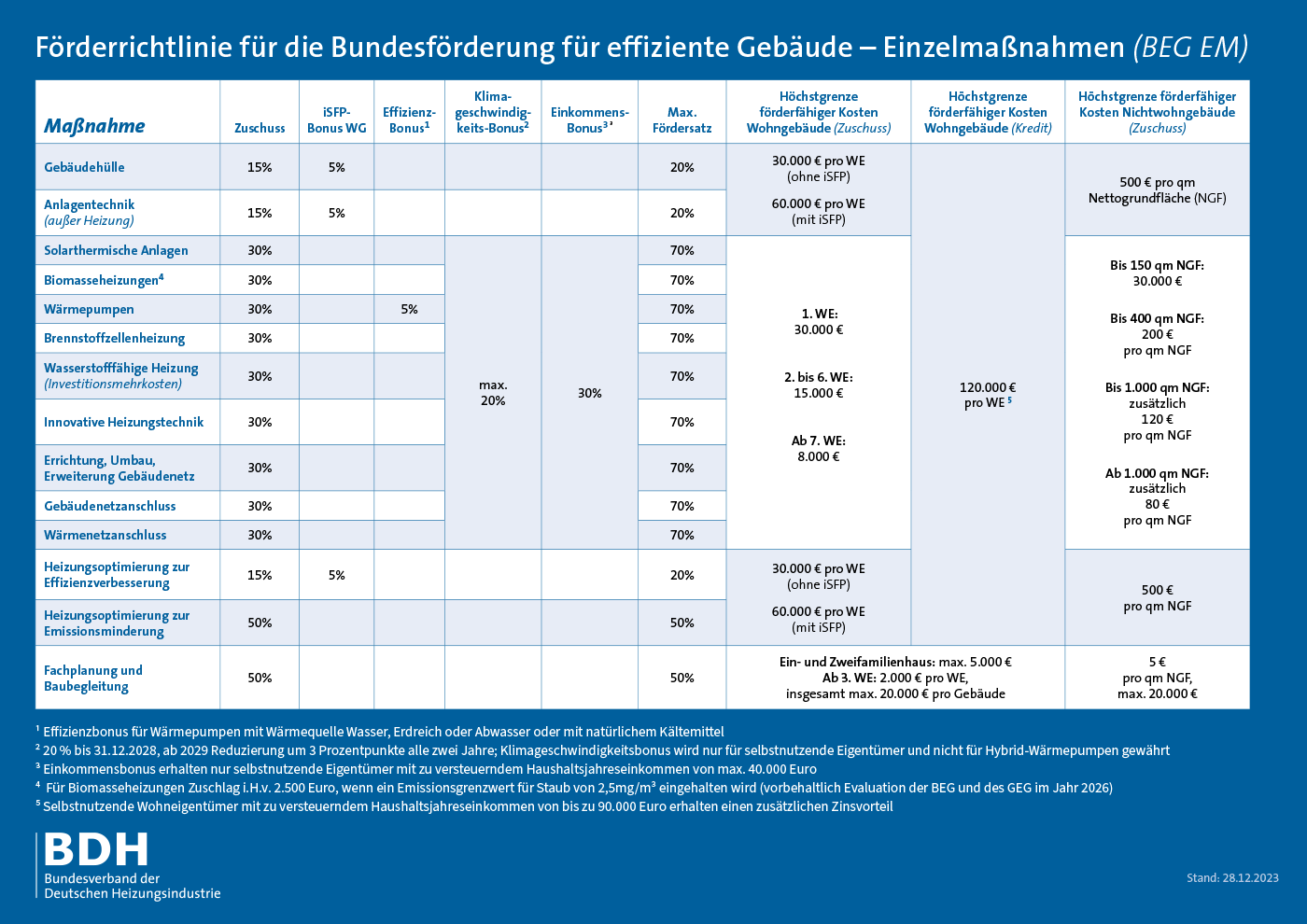
In order to overcome the dependence on fossil fuels in the building sector, the German government has decided that in future, every newly installed heating system should be powered by 65 per cent renewable energy. This requirement will be implemented via the Building Energy Act (GEG) from 1 January 2024.
From 1 January 2024, the GEG will initially apply to all newly installed heating systems in new buildings in designated new development areas (building application 2024). Only heating systems based on a 65% share of renewable energies may be installed here (§71 GEG).
Technical fulfilment options based on 65 % renewable energies (GEG):
The following fulfilment options can be selected under §71 GEG:
- Electrically powered heat pumps
- Biomass heating systems (e.g. logs, pellets, wood chips)
- Gas or oil heating systems that use climate-friendly fuel with a share of at least 65%: e.g. bio-methane, biogenic liquid gas or green and blue hydrogen, including derivatives produced from these, e.g. renewable liquid fuels (biogenic or hydrogen-based GreenFuels)
- Heat pump hybrid heating systems in combination with an oil/gas condensing boiler, solar thermal energy or green/blue hydrogen
- “H2 ready” gas heating systems, gas appliances that can later be converted to 100 % hydrogen
- Direct electricity heating systems are only permitted if a rigorous minimum level of structural thermal insulation of the building is met.
- Connection to a heating network
In addition to the 65 % RE fulfilment options (§71 GEG), the following also applies to existing buildings:
- Gas or oil heating systems that were installed before 1 January 2024 can still be operated with up to 100 percent fossil fuel until 31 December 2044 at the latest.
- New gas or oil heating systems are also permitted on a transitional basis and in various constellations to fulfil the requirement for heating with 65% renewable energy, for example as part of a hybrid solution (in combination with a heat pump) or if they are operated proportionally with biomethane or renewable liquid fuels.
- For gas or oil heating systems installed after 1 January 2024, installation deadlines must be observed depending on the size of the municipality [BMWiK]. However, your heating specialist must provide binding consultation in accordance with the GEG. In addition, increasing proportions of renewable energies (biomass, biomethane, green/blue hydrogen, synthetic or biofuels) must be used from 2029 (15 % in 2029, 30 % in 2035, 60 % in 2040).
- If the gas or oil heating system is defective, it can be repaired.
- For irreparably defective natural gas or oil heating systems, there are transitional periods during which they must reach the 65% EE obligation. Used heating systems or rental heating systems can be considered as transitional solutions.
For further information: FAQ from the BMWiK (in German)
Funding for climate-friendly heating technology is provided by KfW as part of the “Federal Funding Programme for Efficient Buildings (BEG)”.
Further information on the subsidy:
Federal subsidy for efficient buildings (BEG) | KfW (in German)
BMWK - Federal subsidy for efficient buildings (BEG) (energiewechsel.de) (in German)
As of 1 January 2020, tax incentives are available for energy-efficient refurbishment measures on owner-occupied residential property that is at least 10 years old. (§ 35c EstG Income Tax Act). The same technologies are subsidised as in the BEG EM. Homeowners can deduct 20% of the investment costs from their tax liability over three years.
In addition, 50% of the costs for energy consulting, specialist planning and construction supervision can be deducted from the tax liability.
The application can be made with the tax return after completion of the measure.
The accumulation of refurbishment measures funded under the BEG programme with tax deductions is excluded.
Further information: Explained in brief: tax incentives for energy-efficient building refurbishment in owner-occupied homes (energiewechsel.de) (in German)
